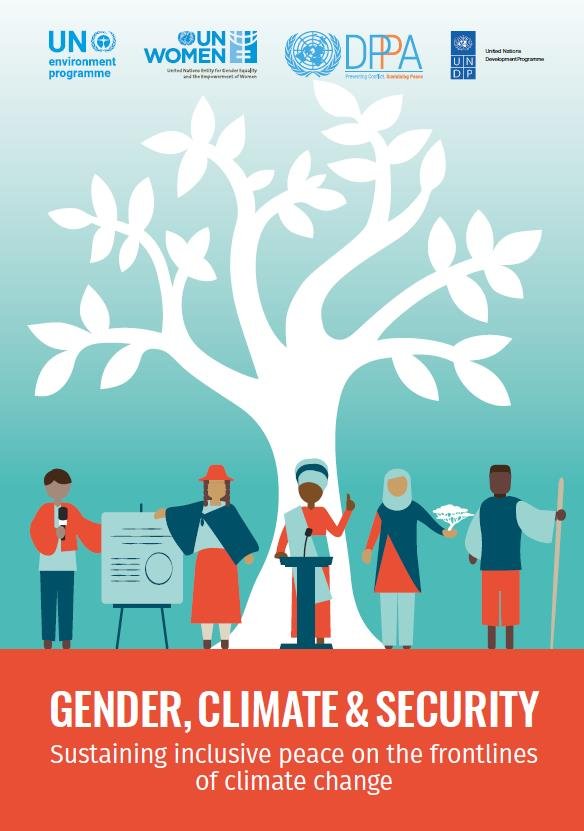- Share this article
- Subscribe to our newsletter
Gender, Climate & Security
The report Gender, Climate & Security: Sustaining Inclusive Peace on the Frontlines of Climate Change reveals the close links between gender, climate and security, and shows that women on the frontlines of climate action are playing a vital role in conflict prevention and sustainable, inclusive peace. It was published by the UN Environment Programme (UNEP), UN Women, the UN Development Programme (UNDP), and the UN Department of Political and Peacebuilding Affairs (UNDPPA) in June 2020.
Communities affected by conflict and climate change are facing a double crisis. The pandemic is further compounding the impacts of climate change on food security, livelihoods, social cohesion and security. This can undermine development gains, escalate violence and also disrupt fragile peace processes, according to the report.
Women and girls are facing disproportionate economic burdens due to different types of marginalisation; gendered expectations can lead men and women to resort to violence when traditional livelihoods fail; and important socio-economic shifts can result from changes to patterns of migration.
Examples show the linkages between gender, climate and security
Research supporting the report shows that in Chad, gender-based violence and structural inequality limit the capacity of communities to adapt to climate shocks. In Sudan, the growing scarcity of fertile land caused by extended droughts and rainfall fluctuation is marked by increases in local conflicts between farmers and nomadic groups. Many people –mostly men– have migrated away from local villages in search of alternative livelihoods in large agricultural schemes or in nearby mines, leaving women with greater economic burdens.
Other examples highlight climate-related security risks for women in urban areas, especially within informal settlements. Research from Pakistan and Sierra Leone suggest that water shortages, heat waves and extreme weather events can create new risks of gender-based violence and deepen pervasive inequalities.
Gender-responsive action needed
The report makes clear the urgent need for gender-responsive action to tackle these linked crises. Interventions around natural resources, the environment and climate change, for example, provide significant opportunities for women’s political and economic leadership, and strengthen their contributions to peace. Sustainable natural resource programming also offers opportunities to mitigate sexual and gender-based violence in conflict. Recognising that peace and security, human rights and development are interdependent is vital to forge a better future, the report argues.
Gender considerations should also be fully reflected in emerging policy and programming on climate-related security risks – not only to strengthen awareness and understanding of particular vulnerabilities, but also to highlight opportunities for leadership and inclusion of women and marginalized groups in decision-making processes.
More investment for gender equality and women’s empowerment is required in fragile states, including implications on human mobility, and especially in sectors related to natural resources, where it is particularly low.
(UNEP/ile)
More information and download of the report Gender, Climate & Security: Sustaining Inclusive Peace on the Frontlines of Climate Change at UNEP website





Add a comment
Be the First to Comment